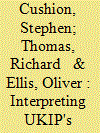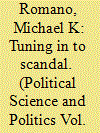| Srl | Item |
| 1 |
ID:
151580


|
|
|
|
|
| Summary/Abstract |
Despite strict state controls, negative news about local officials is reported in China. Faced with political constraints and the incentive and pressure to earn profits, municipal television news programmes have developed and adopted the life news model (minsheng xinwen), which aims to help citizens solve problems. The production process of this news model has transformed the political role of the broadcast media at the local level. Many life news reports focus on disputes between citizens and local officials. Thus, addressing citizen grievances essentially facilitates public service provision. Based on an ethnographic case study of a municipal television news programme, this article finds that the production process of life news reports can facilitate public service provision by correcting local officials’ behaviour, regardless of whether the news reports are eventually broadcast. This unintended role is a result of the power negotiation between local officials and journalists who face immense commercial pressure.
|
|
|
|
|
|
|
|
|
|
|
|
|
|
|
|
| 2 |
ID:
092514


|
|
|
| 3 |
ID:
138890


|
|
|
|
|
| Summary/Abstract |
UK broadcasters came under fire for the amount of airtime UKIP and its leader Nigel Farage received after the party won the most votes in the 2014 EU election. Our content analysis of television news during the 2009 and 2014 campaigns found little bias in terms of soundbites, but in the more recent election Farage visually appeared in coverage to a greater degree than other party leaders. Moreover, two core UKIP policies—being in or out of Europe and immigration—dominated coverage in 2014. We suggest the ‘UKIP factor’ and the media's fascination with Nigel Farage help explain why the 2014 campaign was more visible on television news than was the case in 2009 and was largely reported through a Westminster prism. Although television news bulletins attempt to impartially report elections, the 2014 campaign agenda was largely contested on UKIP's ideological terrain and the party's electoral fortunes.
|
|
|
|
|
|
|
|
|
|
|
|
|
|
|
|
| 4 |
ID:
128745


|
|
|
|
|
| Publication |
New Delhi, Routledge, 2013.
|
| Description |
xx, 428p.Hbk
|
| Standard Number |
9780415812443
|
|
|
|
|
|
|
|
|
|
|
|
Copies: C:1/I:0,R:0,Q:0
Circulation
| Accession# | Call# | Current Location | Status | Policy | Location |
| 057651 | 302.230954/SAE 057651 | Main | On Shelf | General | |
|
|
|
|
| 5 |
ID:
163799


|
|
|
| 6 |
ID:
143769


|
|
|
|
|
| Summary/Abstract |
Besides being the most influential television news program with the largest viewership in China, Xinwen Lianbo (Television News Simulcast) also boasts of unique political value in the Chinese media landscape. Each and every change in form the program has adopted since its first broadcast in 1978, has been a reflection of a certain aspect or element of the arch of political reform in the country, and has been widely interpreted as such, thus making it ‘the toughest nut to crack’ in news reform. Throughout its 35 years of history, by striving to represent, maintain, adapt and disseminate the established ideological framework, thus ensuring political reform has progressed at a cautious and gradual pace acceptable to the ruling party, Xinwen Lianbo has proven to be a great example of the construction of political reality by journalistic text on the symbolic level. This article adopts the methodology of new social history with semi-participatory observation as it combs through the evolution of Xinwen Lianbo over 35 years, in an attempt to explore the patterns and paths of Chinese journalistic reform and the factors that have come to shape this journey in the broader context of political reform in China.
|
|
|
|
|
|
|
|
|
|
|
|
|
|
|
|
| 7 |
ID:
131677


|
|
|
| 8 |
ID:
163794


|
|
|
|
|
| Summary/Abstract |
Shock events are often pivotal moments in geopolitics and objects of intense disagreement among conflicting parties. This paper examines the downing of a Malaysia Airlines passenger jet over eastern Ukraine in July 2014 and the divergent blame storylines produced on Russian and Ukrainian television about the event. It then examines results of a question asking why MH17 crashed in a simultaneous survey conducted in December 2014 in six oblasts in Southeastern Ukraine, Crimea, and the de facto states of Abkhazia, South Ossetia and Transnistria. An analysis of the surveys shows that blame attribution was driven more by television viewing habits than by any other factor.
|
|
|
|
|
|
|
|
|
|
|
|
|
|
|
|